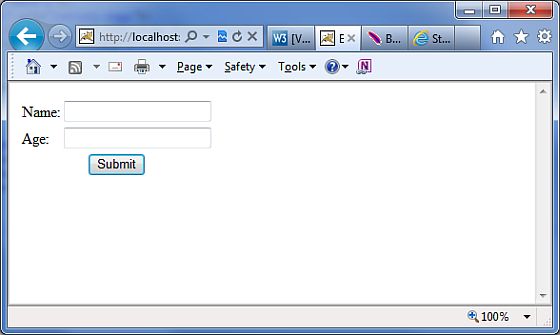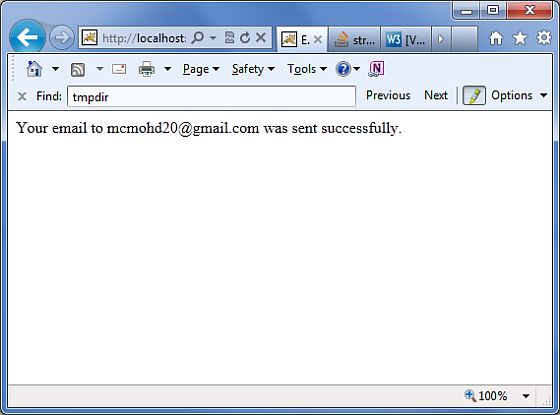Struts2發送Email
本章將教你如何使用Struts2應用程序發送電子郵件(Email)。在本練習中,您需要mail.jar的JavaMail API 1.4.4下載並安裝在你的WEB-INF\lib文件夾,並把mail.jar文件,然後繼續遵循的標準步驟創建動作,視圖和配置文件。
創建動作- Action:
下一個步驟是創建的操作方法負責發送電子郵件。讓我們創建一個新類叫Emailer.java包含以下內容。
package com.tutorialspoint.struts2;
import java.util.Properties;
import javax.mail.Message;
import javax.mail.PasswordAuthentication;
import javax.mail.Session;
import javax.mail.Transport;
import javax.mail.internet.InternetAddress;
import javax.mail.internet.MimeMessage;
import com.opensymphony.xwork2.ActionSupport;
public class Emailer extends ActionSupport {
private String from;
private String password;
private String to;
private String subject;
private String body;
static Properties properties = new Properties();
static
{
properties.put("mail.smtp.host", "smtp.gmail.com");
properties.put("mail.smtp.socketFactory.port", "465");
properties.put("mail.smtp.socketFactory.class",
"javax.net.ssl.SSLSocketFactory");
properties.put("mail.smtp.auth", "true");
properties.put("mail.smtp.port", "465");
}
public String execute()
{
String ret = SUCCESS;
try
{
Session session = Session.getDefaultInstance(properties,
new javax.mail.Authenticator() {
protected PasswordAuthentication
getPasswordAuthentication() {
return new
PasswordAuthentication(from, password);
}});
Message message = new MimeMessage(session);
message.setFrom(new InternetAddress(from));
message.setRecipients(Message.RecipientType.TO,
InternetAddress.parse(to));
message.setSubject(subject);
message.setText(body);
Transport.send(message);
}
catch(Exception e)
{
ret = ERROR;
e.printStackTrace();
}
return ret;
}
public String getFrom() {
return from;
}
public void setFrom(String from) {
this.from = from;
}
public String getPassword() {
return password;
}
public void setPassword(String password) {
this.password = password;
}
public String getTo() {
return to;
}
public void setTo(String to) {
this.to = to;
}
public String getSubject() {
return subject;
}
public void setSubject(String subject) {
this.subject = subject;
}
public String getBody() {
return body;
}
public void setBody(String body) {
this.body = body;
}
public static Properties getProperties() {
return properties;
}
public static void setProperties(Properties properties) {
Emailer.properties = properties;
}
}
正如在上麵的源代碼中看到中,Emailer.java有下麵給出的email.jsp頁的形式中的屬性相對應的屬性。這些屬性是
-
from - 發送者的電子郵件地址。由於我們使用的是穀歌的SMTP,我們需要一個有效的gtalk ID
-
password - 上述帳戶的密碼
-
to - 誰發送的電子郵件?
-
Subject - 該電子郵件的主題
-
body - 實際的電子郵件消息
我們有冇有考慮過上述領域的任何驗證,驗證將被添加在接下來的一章。現在讓我們看看execute()方法。 execute()方法使用的javax郵件庫發送電子郵件使用提供的參數。如果郵件被發送成功,動作返回"SUCCESS",否則返回"ERROR"。
創建一個主頁麵:
讓我們寫主JSP文件index.jsp,這將被用來收集電子郵件相關的上述信息:
<%@ page language="java" contentType="text/html; charset=gbk" pageEncoding="ISO-8859-1"%> <%@ taglib prefix="s" uri="/struts-tags"%> <!DOCTYPE html PUBLIC "-//W3C//DTD HTML 4.01 Transitional//EN" "http://www.w3.org/TR/html4/loose.dtd"> <html> <head> <title>Email Form - www.gitbook.net</title> </head> <body> <em>The form below uses Google's SMTP server. So you need to enter a gmail username and password </em> <form action="emailer" method="post"> <label for="from">From</label><br/> <input type="text" name="from"/><br/> <label for="password">Password</label><br/> <input type="password" name="password"/><br/> <label for="to">To</label><br/> <input type="text" name="to"/><br/> <label for="subject">Subject</label><br/> <input type="text" name="subject"/><br/> <label for="body">Body</label><br/> <input type="text" name="body"/><br/> <input type="submit" value="Send Email"/> </form> </body> </html>
創建視圖:
我們將使用JSP文件的success.jsp將被調用的情況下動作返回“SUCCESS”,但返回的動作,我們將有另一種觀點認為文件中的錯誤的情況下。
<%@ page language="java" contentType="text/html; charset=ISO-8859-1" pageEncoding="ISO-8859-1"%> <%@ taglib prefix="s" uri="/struts-tags"%> <!DOCTYPE html PUBLIC "-//W3C//DTD HTML 4.01 Transitional//EN" "http://www.w3.org/TR/html4/loose.dtd"> <html> <head> <title>Email Success</title> </head> <body> Your email to <s:property value="to"/> was sent successfully. </body> </html>
下麵將視圖文件error.jsp的錯誤的情況下返回的動作。
<%@ page language="java" contentType="text/html; charset=ISO-8859-1" pageEncoding="ISO-8859-1"%> <%@ taglib prefix="s" uri="/struts-tags"%> <!DOCTYPE html PUBLIC "-//W3C//DTD HTML 4.01 Transitional//EN" "http://www.w3.org/TR/html4/loose.dtd"> <html> <head> <title>Email Error</title> </head> <body> There is a problem sending your email to <s:property value="to"/>. </body> </html>
配置文件:
現在,讓我們把一切融合在一起使用struts.xml中的配置文件如下:
<?xml version="1.0" encoding="UTF-8"?>
<!DOCTYPE struts PUBLIC
"-//Apache Software Foundation//DTD Struts Configuration 2.0//EN"
"http://struts.apache.org/dtds/struts-2.0.dtd">
<struts>
<constant name="struts.devMode" value="true" />
<package name="helloworld" extends="struts-default">
<action name="emailer"
class="com.tutorialspoint.struts2.Emailer"
method="execute">
<result name="success">/success.jsp</result>
<result name="error">/error.jsp</result>
</action>
</package>
</struts>
以下是web.xml文件中的內容:
<?xml version="1.0" encoding="UTF-8"?>
<web-app xmlns:xsi="http://www.w3.org/2001/XMLSchema-instance"
xmlns="http://java.sun.com/xml/ns/javaee"
xmlns:web="http://java.sun.com/xml/ns/javaee/web-app_2_5.xsd"
xsi:schemaLocation="http://java.sun.com/xml/ns/javaee
http://java.sun.com/xml/ns/javaee/web-app_3_0.xsd"
id="WebApp_ID" version="3.0">
<display-name>Struts 2</display-name>
<welcome-file-list>
<welcome-file>index.jsp</welcome-file>
</welcome-file-list>
<filter>
<filter-name>struts2</filter-name>
<filter-class>
org.apache.struts2.dispatcher.FilterDispatcher
</filter-class>
</filter>
<filter-mapping>
<filter-name>struts2</filter-name>
<url-pattern>/*</url-pattern>
</filter-mapping>
</web-app>
現在,右鍵點擊項目名稱,並單擊“導出”> WAR文件創建一個WAR文件。然後,這WAR部署在Tomcat的webapps目錄下。最後,啟動Tomcat服務器,並嘗試訪問URL http://localhost:8080/HelloWorldStruts2/index.jsp。這會給你以下畫麵:

輸入所需信息,然後單擊“Send Email”按鈕。如果一切順利,那麼你應該看到下麵的頁麵

end over.

